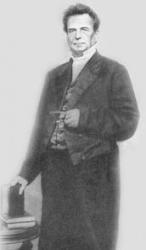
1794 - 1870 Author of "Weep for the lost, thy Savior wept" Colver, Nathaniel, D.D., an eminent preacher and abolitionist, born at Orwell, Vermont, 1794, and entered the Baptist Ministry in 1836, becoming successively Pastor at Boston, Detroit, Cincinnati, and Chicago. After the war, in 1865, he founded the Colver Institute at Richmond, Virginia. He died Sept. 25, 1870. In 1848 he contributed 17 hymns to Banvard's Christian Melodist, Boston, U.S; Of these the best known are:—“Come, Lord, in mercy come again," Lent; and " Weep for the lost! thy Saviour wept" (Sympathy), as in the Baptist Praise Book, N. Y., 1871, &c. [Rev. F. M. Bird, M.A.]
--John Julian, Dictionary of Hymnology (1907)
=============================
Colver, Nathaniel. (Orwell, Vermont, May 10, 1794--September 25, 1870), Chicago, Illinois). Baptist. Granville College (Denison University) D.D. 1856. Pastorates at West Clarendon, Vermont, 1819-1821; Fort Covington, New York; Kingsbury, New York; Fort Ann, New York; Union Village, New York, 1834-1838; Holmesburgh, Pennsylvania, 1834; Tremont Temple, Boston, 1839-1852; South Abington, Massachusetts, 1852-1853; Detroit, Michigan, 1853-1856; Cincinnati, Ohio, 1856-1861; Chicago, Illinois, 1861. In 1865, he founded the Colver Institute, which survives in the theology department of Virginia Union University at Richmond, Virginia; became president of the Freedman's Institute, Richmond, Virginia, 1867-1870. He was a founder of the Divinity School of the University of Chicago. He was very active in anti-masonic, anti-slavery, and temperance movements. He authored the hymn "While the earth is clad in darkness," which was the first hymn sung at his installation in Boston, September 15, 1839. He also wrote "Great God, before thy revered name, Within these ransomed walls we bow," which was sung at the dedication of Tremont Temple (formerly Tremont Theatre) on December 7, 1843. He is the author of the Lenten hymn, "Come, Lord, in mercy come again, with thy converting power," which, along with sixteen other of his hymns, appeared in the Christian Melodist which was compiled by Joseph Banvard in 1848. He contributed five hymns to Ocean Melodies (1849), a collection of hymns compiled by Phineas Stowe for seamen. He also wrote the hymn "Weep for the lost! thy Savior wept O'er Salem's hapless doom" which appeared in the Baptist Praise Book in 1871. See J. A. Smith, Memoir of Rev. Nathaniel Colver, D.D. (1873).
--Scotty Wayne Gray, DNAH Archives
Nathaniel Colver
